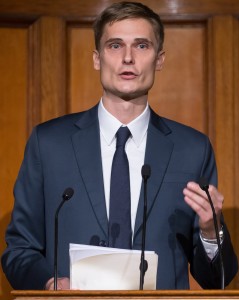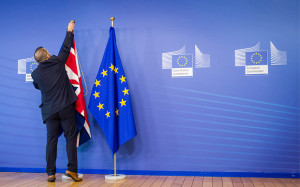Since the UK announced it wants to ratify the Unified Patent Court Agreement despite the Brexit vote (last week the new IP minister of the UK, Jo Johnson, repeated the announcement of his predecessor Baroness Neville-Rolfe), preparations for the system have restarted in full, despite the fact that a British membership brings about uncertainty. Prof. Dr. Thomas Jaeger, European law expert of the University of Vienna, is very critical of the way the UP system has been pushed through over the last years, most recently after the Brexit vote. Kluwer IP Law interviewed Dr. Jaeger.
In a recent position paper you wrote: ‘The US experience (..) has taught us, a bad patent system is worse having than no patent system’. Is Europe heading for a ‘bad patent system’?
‘What makes the UPC a bad system are its intrinsic design flaws. The most important ones are the lack of consolidation of patent jurisdiction in the new system, as there will be national, EPC and Unitary Patents which all have their own procedures of review with their own interpretation of patent law. So the lack of consolidation in the existing system will be aggravated.
Another negative feature is the persisting dominance of national traditions in regional and local divisions (majority of national judges in large divisions, bifurcation compromise, three-partition of the central division, for instance).

Also, the UP system is friendly to right holders (and therefore misses a fair balance between right holders and third parties), because it makes patent enforcement easier for them whereas patent accessibility is not likewise facilitated. Examples are the absence of compulsory licenses and the inclusion of the bifurcation compromise. I see an incentive created by the system to abuse it for bad or questionable patents to impede competitors (and I don’t mean trolling, but impediments created by the normal clashing of patents on the market). My former colleagues at the Munich Max Planck Institute and I have elaborated these and other flaws at many occasions, see for instance this summary.
According to your article, the ‘Unitary Patent Regulation (…) lacks all determination of the shape of the right and neglects third-party interests’. Could you explain?
‘A complete regime for any IP right should stipulate rules on three levels that determine how the right is obtained and what the right holder may do with it: requirements for protection, exceptions and limitations and property rules. All previous EU IP Regulations (concerning trademarks, designs and to some extent also plant varieties) contain a ‘full’ regime in that sense, and the older proposals for an EU patent likewise did.
Now however, the UP Regulation does not contain rules on any of these three levels, but instead simply makes references to third law: The EPC for the requirements of protection, national laws harmonized via the UPCA for exceptions and limitations and the various participating national laws for the property rules.
This lack of own determination of the EU law-based right may become a problem once the CJEU is called upon to determine the scope of the Unitary Patent: Will those rules of international law bind the interpretation of the CJEU? Likely not, as EU law and the CJEU’s freedom to interpret it is at the top of the EU legal order. In addition, the UP Regulation, by simply perpetuating patent law as it is, missed a chance to modernize the law (especially for exceptions and limitations, or for compulsory licenses, which are not foreseen and will therefore likely not be available for Unitary Patents).’
 It seems you were surprised about and question the CJEU endorsement of the Art. 142-fiction and other decisions of the CJEU regarding the Unitary Patent system, when this was challenged by Spain and Italy, for instance.
It seems you were surprised about and question the CJEU endorsement of the Art. 142-fiction and other decisions of the CJEU regarding the Unitary Patent system, when this was challenged by Spain and Italy, for instance.
‘The Art 142 fiction is not convincing: How can an EU Regulation be regarded as a regional agreement to the EPC, when the EU is not a party to the EPC? This confuses the EU legislator with the EU Member States, who are parties to the EPC (but cannot legislate on EU law). However, had the CJEU not embraced that fiction (which it does not explain at all, but which it just repeats from the parties’ submissions, where it is also not explained), none of the follow-up reasoning to waive the UP Regulation through would have worked. In particular, the UP Regulation would have run into deep trouble with 1) the fact, that the EPO cannot be entrusted to administer the Unitary Patent if the EU is not a party to the EPC; plus 2) the Meroni line of case law, which forbids the conferral of discretionary powers to agencies. I think the transformation fiction is wrong and dangerous (the Advocates General in their Joint Statement to Opinion 1/09 were also weary of it). In any case, it is unprecedented in internal market legislation.’
‘Brexit provides the opportunity to take a step back, reset the table and start afresh’, you have written. This is obviously not the course the UPC Preparatory Committee and the EPO Select Committee have chosen. What do you hope to achieve?
‘I hope to achieve nothing, I take a scholarly perspective and analyse the law and legal developments as I see them and without bias or the necessity for my observations to be heeded by politics. Most scholars are never heard by politicians, but still their work is immensely valuable in order to understand developments ex post and as a basis for future decisions in similar cases. Finally, let’s not forget that there is a revision clause in the UPCA, so at least some design flaws, might be remedied then.’
What do you think about the UK government’s announcement that it will ratify the UPCA?
‘I believe that the UPCA ratification will not occur separately from an overall deal between the UK government and Parliament on the conditions of Brexit. So I don’t expect ratification any time soon. As regards the legal implications of such a move, those are elaborated in my paper: If the UK does not ratify, we will need a new UPCA to be drawn up. Plus, what would be the sense of a system without the UK inside?
 If the UK does ratify and subsequently Brexits, we will in any case have a non-EU member state within that system, so the UPC will be a different type of court from what the Commission has propagated since Opinion 1/09: the Benelux-fiction will collapse (meaning the claim by Commission and Council after Opinion 1/09 that the UPC was compatible with EU law, because the UPC is really not at all an international court, but rather part of the national court systems, similar to the Benelux Court). That collapse would open the way for other non-EU EPC states back into the system. Whether such a court would be compatible with EU law however, remains to be seen. The most important difference to the model under review in Opinion 1/09 was the kick-out of the EU and its restriction to EU Member States only. If that is no longer so, what’s the remaining difference between the UPC and the previous, incompatible model? I see a lot of uncertainty in that regard for years to come, because the issue will likely only reach the CJEU once the system is operational (e.g. via a reference from a national court).’
If the UK does ratify and subsequently Brexits, we will in any case have a non-EU member state within that system, so the UPC will be a different type of court from what the Commission has propagated since Opinion 1/09: the Benelux-fiction will collapse (meaning the claim by Commission and Council after Opinion 1/09 that the UPC was compatible with EU law, because the UPC is really not at all an international court, but rather part of the national court systems, similar to the Benelux Court). That collapse would open the way for other non-EU EPC states back into the system. Whether such a court would be compatible with EU law however, remains to be seen. The most important difference to the model under review in Opinion 1/09 was the kick-out of the EU and its restriction to EU Member States only. If that is no longer so, what’s the remaining difference between the UPC and the previous, incompatible model? I see a lot of uncertainty in that regard for years to come, because the issue will likely only reach the CJEU once the system is operational (e.g. via a reference from a national court).’
Have EU politics harmed the creation of a European patent system?
‘I think that the Commission’s decade-long determination to come up with an EU patent in spite of so much political opposition has not done the project any good: There is so much compromise in the system, that it’s really just an emergency patchwork. The most visible example for this is the fact that both the substantive right (UP Regulation) and the litigation system (UPC) are limited to certain states for participation. This is so far away from what the Commission had initially had in mind and what boosting business in Europe would actually need. And every new obstacle that pops up adds new compromise and new dysfunctionalities: CJEU Opinion 1/09, the Spanish language dispute and now Brexit. I have long said that rather than accepting all that compromise, the Commission should have handed the project back to the EPC.’
For regular updates on the Unitary Patent and the Unified Patent Court, subscribe to this blog and the free Kluwer IP Law Newsletter.
________________________
To make sure you do not miss out on regular updates from the Kluwer Patent Blog, please subscribe here.


